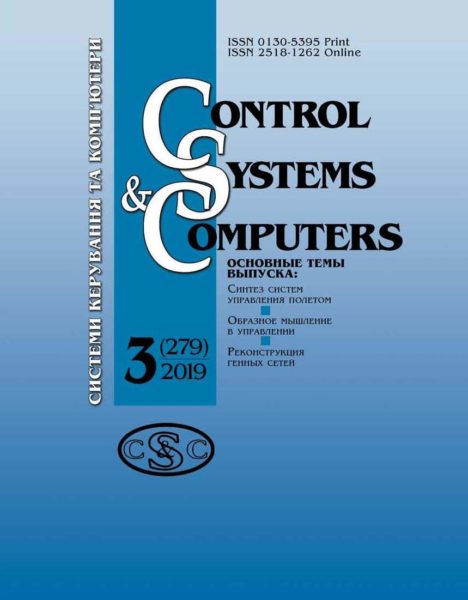Control Systems and Computers, N1, 2023, Article 4
https://doi.org/10.15407/csc.2023.01.054
Control Systems and Computers, 2023, Issue 1 (301), pp. 54-64.
UDC 519.163 + 681.5.015
S.M. YEFIMENKO, PhD in Engineering, Senior Researcher, International Research and Training Center for Information Technologies and Systems of the NAS and MES of Ukraine, Glushkov ave., 40, Kyiv, 03187, Ukraine, ORCID: https://orcid.org/0000-0003-4179-6909, syefim@ukr.net
INTELLIGENT INFORMATION TECHNOLOGY FOR INDUCTIVE MODELING OF COMPLEX PROCESSES ON THE BASIS OF RECURRENT-AND-PARALLEL COMPUTATIONS
The paper develops a novel intelligent information technology for inductive modeling of complex processes by experimental data, the high level of productivity of which is achieved by applying a new concept of combining the efficiency of recurrent and parallel computations. The implementation of such technology in modern intelligent information-and-analytical systems provides a significant increase in the efficiency and validity of making managerial decisions in the tasks of operational management of complex processes.
An example is done of using the developed technology for evaluation and forecast of the investment activity in Ukraine.
Download full text! (On English)
Keywords: inductive modelling, intelligent technology, GMDH, COMBI, MULTI, vector autoregression, recurrent-and-parallel computations.
- Madala, H.R., Ivakhnenko, A.G., 1994. Inductive Learning Algorithms for Complex Systems Modeling. London, Tokyo: CRC Press Inc., 384 p.
- Self-organizing methods in modeling: GMDH type algorithms. Farlow, S.J. (ed.). New York, Basel: Marcel Decker Inc. (1984).
- Yefimenko, S., 2013. “Comparative Effectiveness of Parallel and Recurrent Calculations in Combinatorial Algorithms of Inductive Modelling”. Proceedings of the 4th International Conference on Inductive Modelling ICIM’2013, Kyiv, pp. 231-234.
- Stepashko, V.S., 1981. “A Combinatorial Algorithm of the Group Method of Data Handling with Optimal Model Scanning Scheme”. Soviet Automatic Control, 14(3), pp. 24–28.
- Stepashko, V.S. Efimenko, S.N., 2005. “Sequential Estimation of the Parameters of Regression Model,” Cybernetics and Systems Analysis, Springer New York, 41 (4), pp. 631-634.
https://doi.org/10.1007/s10559-005-0099-3 - Stepashko, V. Yefimenko, S., 2009. “Parallel algorithms for solving combinatorial macromodelling problems,” Przegląd Elektrotechniczny (Electrical Review), 85 (4), pp. 98-
- Stepashko, V.S., 1983. “A Finite Selection Procedure for Pruning an Exhaustive Search of Models”. Soviet Automatic Control, 16(4), pp. 88–93.
- Lutkepohl, H., 1991. Introduction to multiple time series analysis, Springer-Verlag. Berlin and New York, ISBN 0-387-53194-7.
- Stepashko, V.S., Yefimenko, S.M., Pavlov, A.V., 2019. “Recurrent-and-Parallel GMDH lgorithms for High-Performance Computing”. Control Systems and Computers. no 3, pp. 38-51.
https://doi.org/10.15407/csc.2019.03.038 - Yefimenko, S., 2013. “Comparative Effectiveness of Parallel and Recurrent Calculations in Combinatorial Algorithms of Inductive Modelling,” Proceedings of the 4th International Conference on Inductive Modelling ICIM’2013, Kyiv, pp. 231-
- Yefimenko, S. Stepashko, V., 2015. “Intelligent Recurrent-and-Parallel Computing for Solving Inductive Modeling Problems,” Proceedings of 16th International Conference on Computational Problems of Electrical Engineering (CPEE-2015), Lviv, Ukraine, pp. 236-238.
https://doi.org/10.1109/CPEE.2015.7333385. - Stepashko, V., Voloschuk, R., Yefimenko, S., 2021. “Technology of Quantitative Integral Assessment and Forecast of a Complex Economic System Performance” / In: Advances in Intelligent Systems and Computing V. AISC book series. Vol. 1093. Cham: Springer, pp. 841-856.
https://doi.org/10.1007/978-3-030-63270-0_58. - Yefimenko, S., 2018. “Building Vector Autoregressive Models Using COMBI GMDH with Recurrent-and-Parallel Computations,” In: Advances in Intelligent Systems and Computing II / N. Shakhovska, V. Stepashko, Editors. AISC book series, vol. 689, Cham: Springer, pp. 601-613.
https://doi.org/10.1007/978-3-319-70581-1_42
Received 12.02.2023



